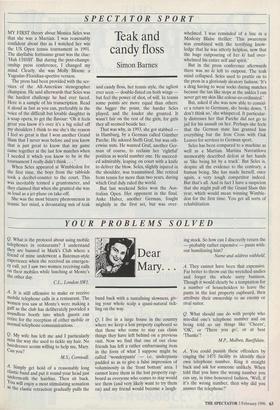SPECTATOR SPORT
Teak and candy floss
Simon Barnes
MY FIRST theory about Monica Seles was that she was a Martian. I was reasonably confident about this as I watched her win the US Open tennis tournament in 1991. The disyllabic fortissimo grunt was the clue: `Huh UHHH'. But during the• post-champi- onship press conference, I changed my mind. Clearly, she was Molly Bloom: a Yugoslav-Floridian-sportive version.
The press had been provided with the ser- vices of the All-American stenographer champion. He said afterwards that Seles was the hardest challenge he •had ever faced. Here is a sample of his transcription. Read it aloud as fast as you can, preferably in the voice of the difficult but lovable daughter in a soap opera, to get the flavour: 'Oh it feels great you know it's over it's a big relief off my shoulders I think to me she's the reason I feel so great is that I won another Grand Slam that I never won before and you know that is just great to know that my game came together at the last few matches when I needed it which you know to be in the tournament I really didn't think . . . '
When Seles appeared at Wimbledon for the first time, the boys from the tabloids took a decibel-counter to the court. This was inevitably termed a gruntometer, and they claimed that when she grunted she was as loud as a jet-plane on take-off.
She was the most bizarre phenomenon in tennis: her mind, a devastating mix of teak and candy floss, her tennis style, the ugliest ever seen — double-fisted on both wings but feel the power of shot, of will. In tennis some points are more equal than others: the bigger the point, the harder Seles played, and the louder she grunted. It wasn't fair on the rest of the girls, for girls they all seemed beside her.
That was why, in 1993, she got stabbed in Hamburg, by a German called Gunther Parche. He adored Steffi Graf, but was oth- erwise nuts. He wanted Graf, another Ger- man of course, to reclaim her 'rightful' position as world number one. He succeed- ed admirably, leaping on court with a knife to deliver the blow. Seles, slightly injured in the shoulder, was traumatised. She retired from tennis for more than two years, during which Graf duly ruled the world.
But last weekend Seles won the Aus- tralian Open. Her opponent in the final, Anke Huber, another German, fought mightily in the first set, but was over- whelmed. I was reminded of a line in a Modesty Blaise thriller: 'This awareness was combined with the terrifying know- ledge that he was utterly helpless, now that the huge outpouring of her ki had over- whelmed his entire self and spirit.'
But in the press conference afterwards there was no ki left to outpour. The teak mind collapsed. Seles used to prattle on to the press in a gloriously aleatory fashion: 'It's a drag having to wear socks during matches because the tan like stops at the ankles I can never get my skin like colour-co-ordinated.'
But, asked if she was now able to consid- er a return to Germany, she broke down. 'I don't think so,' she whispered. It particular- ly distresses her that Parche did not go to jail for his assault on her. Perhaps she feels that the German state has granted him everything but the Iron Cross with Oak Leaves for services to German sport.
Seles has been compared to a machine as well as a Martian. Martina Navratilova memorably described defeat at her hands as 'like being hit by a truck'. But Seles is, despite all the evidence to the contrary, a human being. She has made herself, once again, a very tough competitor indeed. But that's all. And in fact I have a suspicion that she might pull off the Grand Slam this year, which would mean winning Wimble- don for the first time. You get all sorts of rehabilitation.


































































 Previous page
Previous page